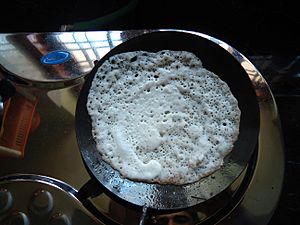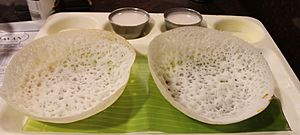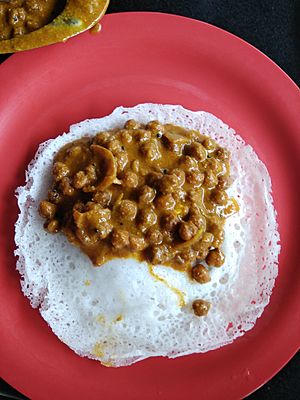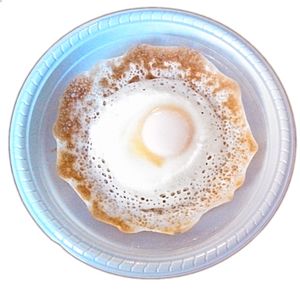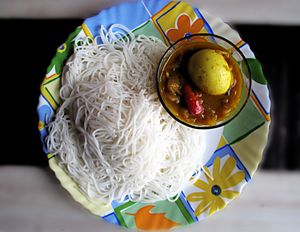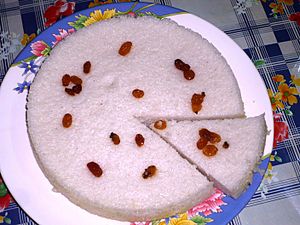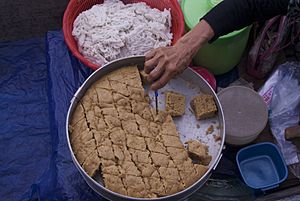Appam facts for kids
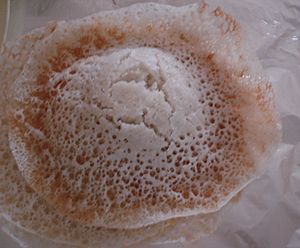
Appam
|
|
| Alternative names | Hoppers, Ãppa, kallappam, vellappam, palappam |
|---|---|
| Type | Pancake or griddle cake |
| Course | Breakfast or dinner |
| Associated national cuisine | India, Sri Lanka |
| Main ingredients | Rice batter |
| Variations | Egg hoppers |
Appam is a yummy type of pancake that comes from South India. It's made using a special batter from fermented rice and coconut milk. You'll find it often in places like Kerala and Tamil Nadu in India. People usually eat appam for breakfast or dinner.
Contents
A Peek into Appam's Past
Did you know appam has a long history? A food expert named K. T. Achaya says that appam is mentioned in an old Tamil book called Perumpanuru. This shows that appam was a popular dish in ancient Tamil country a very long time ago!
Different Kinds of Appam
Appam comes in many exciting forms! Each one has its own special twist.
Plain Appam
Plain appam, also known as vella appam, looks like a thin, bowl-shaped pancake. It's made from fermented rice flour. These appams get their unique shape from the small pan they are cooked in, called an appachatti.
Egg Appam
Egg appams are just like plain appams, but with a fun addition! As the pancake cooks, an egg is cracked right into the middle. This makes a delicious and filling meal.
Idiyappam (String Hoppers)
Idiyappam is also known as string hopper or noolputtu. It's made from rice noodles that are curled into flat spirals. People often eat idiyappam for breakfast. It's usually served with a light fish or chicken curry. You might also find it with a dhal (lentil) dish or a spicy sambol (a chili paste). Sometimes, a creamy coconut milk curry called Kiri hodi is served with it.
To make string hoppers, rice flour is mixed with water and a little salt to form a dough. This dough is then pushed through a special tool, like those used for pasta, to create the noodle strings. The strings are then cooked by steaming. Some people even sprinkle grated coconut on top. You can buy these hoppers ready-made too. People in India and Sri Lanka enjoy string hoppers for breakfast or dinner. You can even turn this simple dish into other meals, like string hopper biriyani, by adding scrambled eggs or vegetables.
Achappam
Achappam is a crispy, deep-fried cookie that looks like a rose. It's made with rice flour. This sweet treat is a special food for Syrian Christians.
Kuzhalappam
Kuzhalappam is another dish from Syrian Christians. It's a fried crisp that is curled up into a tube shape. It's a crunchy and tasty snack!
Neyyappam
Neyyappam comes from Kerala and has been a traditional offering in Hindu temples. It's made with rice flour, jaggery (a type of unrefined sugar), and clarified butter called ghee. This is the traditional way to make Neyyappam.
A variation of Neyyappam is called Unni appam. For this, mashed plantain is added to the batter. The batter is then poured into a special pan called appakarai or appakaram, which has hot ghee. The appams cook into small cup shapes and are fried until they turn deep brown.
Pesaha Appam
Pesaha appam is made by Nasrani Christians in Kerala. They prepare it during Pesaha (Passover) celebrations. This type of appam is often dipped in a sweet syrup or a special coconut milk called Pesaha Pal before it's eaten.
Vattayappam
Vattayappam is made from rice flour, sugar, and coconut. It's a steamed snack, so it doesn't use any oil! It's a popular tea-time treat in many homes in Kerala. This dish is quite similar to the bánh bò from Vietnam.
Burmese Apon
In Burmese, appam is called apon (အာပုံ). It's a common street food in Burmese cuisine. You'll find it as a special treat in coastal towns in Southern Myanmar, like Dawei and Myeik.
Kue Apem (Indonesian Appam)
In Indonesia, a type of appam is known as kue apem or kue apam. It's a traditional Indonesian kue (cake). It's made from steamed dough using rice flour, coconut milk, yeast, and palm sugar. It's usually served with grated coconut. Indonesian families often make kue apem together for celebrations and festivals. For example, the royal family in Keraton Yogyakarta traditionally holds a Ngapem ceremony. During this, they cook kue apem as part of a special ceremony. It's quite similar to kue mangkok. Just like kue putu, kue apem shows how Indian food has influenced Indonesian cuisine.
See also
 In Spanish: Appam para niños
In Spanish: Appam para niños
 | Madam C. J. Walker |
 | Janet Emerson Bashen |
 | Annie Turnbo Malone |
 | Maggie L. Walker |


